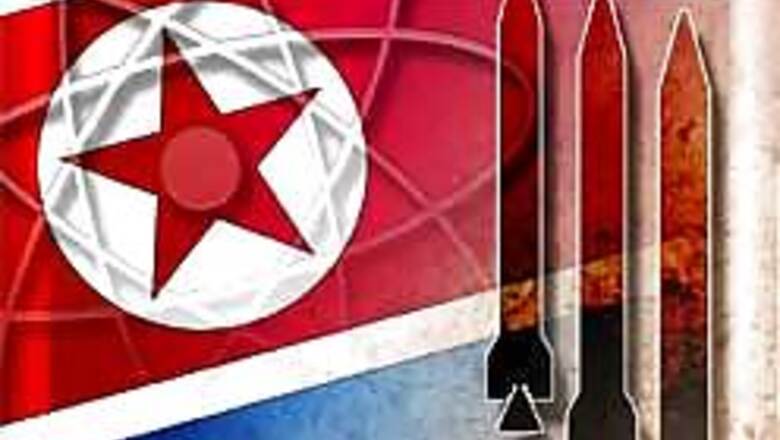
views
Washington: An analysis of air samples collected shortly after North Korea declared it had conducted an underground nuclear explosion confirms the test took place, according to the office of the US director of national intelligence.
The analysis detected radioactive debris, indicating the explosive yield was less than one kiloton, said a statement from John Negroponte's office. That is relatively small for a nuclear test.
The first air sample collected after Pyongyang's announcement last week contained no radioactive debris, but a second one did, CNN reported on Friday.
Officials wanted to do more analysis before confirming the North Korean test. Sources said a nuclear facility in Russia is near the North Korean border, and analysts wanted to rule it out as the source of the radioactive debris.
The development came as a senior US official said on Monday that China is apparently inspecting trucks on its border bound for North Korea despite earlier statements by Beijing's UN envoy proclaiming that it wouldn't.
The inspections are required by UN Security Council Resolution 1718, passed on Saturday in response to North Korea's nuclear test.
One section of the resolution calls for cargo going in and out of North Korea to be searched for prohibited items that could be used in weapons of mass destruction, including nuclear ones.
China voted for the resolution, which was approved unanimously 15-0.
US Undersecretary of State for Political Affairs, Nicholas Burns, told CNN's American Morning on Monday that the Chinese inspections are not the only measure being taken in light of the resolution's weekend passage.
"Australia announced on Monday that it will prohibit all North Korean ships from entering Australian ports, Japan also announced new measures, and we have some indications that the Chinese are also stopping trucks and inspecting them across that 800-mile border," Burns said.
Hours after the resolution passed, Wang Guangya, Chinese ambassador to the United Nations, told reporters that his country would not carry out such inspections. China is North Korea's biggest trading partner.
"For China, our political position is we're not in favor of inspections because it will lead to negative consequences," he said.
However, Burns said the fact that China is inspecting truck cargo is a sign that Beijing will implement the resolution fully.
"And it would be extraordinary, if, in this day and age, given the importance of this issue, a leading member of the Security Council, a permanent member like China, did not implement a resolution it agreed to two days ago. So we will continue to remind the Chinese that that's their obligation," he added.
PAGE_BREAK
The measure forbids trade between UN member states and North Korea in high-end military equipment and material that could be used for nuclear and other weapons of mass destruction.
It requires that Pyongyang not conduct further nuclear tests or launch ballistic missiles, and demands that the country abandon all weapons of mass destruction programs.
It also bans trade in luxury goods and requires member states to freeze the assets of North Korean entities and individuals.
Burns said the measure has "real teeth."
"These are very tough sanctions; they're among the toughest ever imposed on any country by the United Nations," he said. "And we hope they will convince the North Koreans to recalculate the cost and benefits of what they're trying to do, developing a nuclear weapons program."
Former Senator Sam Nunn, who once chaired the Senate Armed Services Committee, said on Monday that North Korea has made a "big miscalculation" in pushing forward with its nuclear program but added that Washington needs to sit down face to face with Pyongyang to move forward.
"The real challenge is to have serious discussions, six-party talks or bilateral, whatever is necessary, so that North Korea can understand that there are both carrots and sticks here," Nunn said.
"And it's enormously important that the United States be willing to discuss security assurances with North Korea, because no nation is likely to give up their nuclear weapons unless they have assurances that the negotiating party is not going to insist on regime change and try to bring them down."
The Bush administration has been reluctant to engage in bilateral discussions with Pyongyang.
"I think the administration has an ideological kind of - to me, not understandable - policy of believing that when you talk to someone, you're rewarding them and if you won't talk to them, you're punishing them. I don't think that's effective punishment," Nunn, who works with the Nuclear Threat Initiative, a group he co-chairs with CNN founder Ted Turner, said.
Meanwhile, the US nuclear talks envoy, Assistant Secretary of State Christopher Hill, is due to arrive in Japan on Monday afternoon and meet with his Japanese counterpart, Kenichiro Sasae, later in the day.
Secretary of State Condoleezza Rice is scheduled to arrive in Tokyo on Wednesday before traveling to Seoul, South Korea, and Beijing for talks Thursday.
Japanese Chief Cabinet Secretary Yasuhisa Shiozaki said the government is arranging for Japanese Foreign Minister Taro Aso to travel to Seoul for talks with South Korea on how to implement the UN sanctions on the North.




















Comments
0 comment